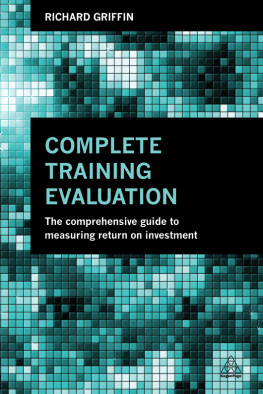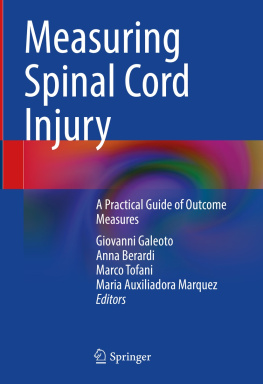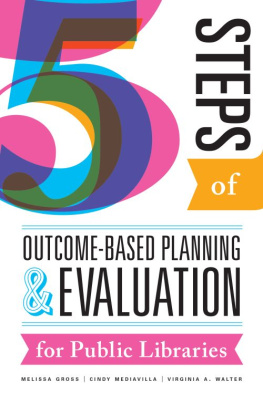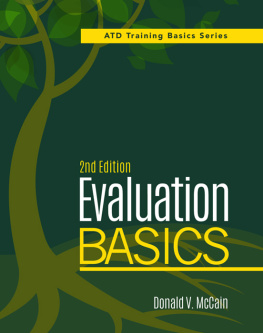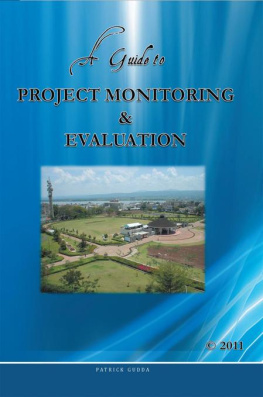A Practical Guide to Outcome Evaluation
Liz Hoggarth and Hilary Comfort
Jessica Kingsley Publishers
London and Philadelphia
First published in 2010
by Jessica Kingsley Publishers
116 Pentonville Road
London N1 9JB, UK
and
400 Market Street, Suite 400
Philadelphia, PA 19106, USA
www.jkp.com
Copyright Liz Hoggarth and Hilary Comfort 2010
All rights reserved. No part of this publication may be reproduced in any material form (including photocopying or storing it in any medium by electronic means and whether or not transiently or incidentally to some other use of this publication) without the written permission of the copyright owner except in accordance with the provisions of the Copyright, Designs and Patents Act 1988 or under the terms of a licence issued by the Copyright Licensing Agency Ltd, Saffron House, 610 Kirby Street, London EC1N 8TS. Applications for the copyright owners written permission to reproduce any part of this publication should be addressed to the publisher.
Warning: The doing of an unauthorised act in relation to a copyright work may result in both a civil claim for damages and criminal prosecution.
Library of Congress Cataloging in Publication Data
Hoggarth, Liz.
A practical guide to outcome evaluation / Liz Hoggarth and Hilary Comfort.
p. cm.
Includes bibliographical references and index.
ISBN 978-1-84905-037-1 (alk. paper)
1. Project management--Evaluation. I. Comfort, Hilary. II. Title.
HD69.P75H65 2010
658.404--dc22
2009037689
British Library Cataloguing in Publication Data
A CIP catalogue record for this book is available from the British Library
ISBN 978 1 84905 037 1
eISBN 978 0 85700 370 6
Converted to eBook by EasyEPUB
Acknowledgements
We are immensely grateful for the support and encouragement of family, friends and colleagues who shared our view that this book was a worthwhile endeavour that could support best practice. In particular, we want to thank Val Chapman who diligently read all our drafts and the many people listed below who have so generously shared their ideas and evaluations with us. Their practical experiences on how to go about outcome evaluation have brought the issues to life for us, and are certain to help those who turn to this book for help in evidencing their results.
Beacon Positive Youth Engagement Peer Support Programme (with its 23 contributing local authorities)
Birmingham Royal Ballet
Catch22
Change Support Difference (CSD) Ltd
Denis Anthony, Professor of Nursing, School of Nursing and Midwifery, De Montfort University
Heywood New Deal for Communities
Kickz
Learning and Skills Council, West Midlands
Leicester College
Lorraine Robinson, Sure Start Childrens Centre, Beaumont Leys, Leicester
New Hope Mentoring Programme
Novas Scarman and its workers, Sharon Nembhard and Sherwayne Mitchell
Pip Wilson and Ian Long, for the Blob Tree
Spurgeons Beyond the Horizon
Staffordshire Fire and Rescue Service
St Pauls Community Development Trust, Balsall Heath
The Childrens Society Shared Care Solihull Programme
Thilo Boeck, The Centre for Social Action, De Montfort University
Tony Williams, for artwork
VCS Matters
Wildside Activity Centre, Wolverhampton
Womens Aid Leicestershire Ltd
Wirral Council
Youth Action Network and the young researchers on Project Re:action
Youth Affairs Unit, De Montfort University
Introduction
This book is intended as a practical handbook on how to evaluate outcomes and is aimed mainly at managers and practitioners in fieldwork in people-orientated professions. We hope it will find a home on your shelf and be used regularly for reference. Recent emphases in national policy and new commissioning frameworks have created an urgent need for statutory, voluntary and even private sector projects to understand how to evaluate and present the outcomes of their work. This applies in many areas such as supported housing, provision under the Childrens Trusts, work with offenders, and health or social regeneration initiatives. Nobody nowadays can avoid the task of performance measurement. This book addresses the practicalities of how to produce evidence of outcomes from interventions in work with people it is a basic, how to book, primarily aimed at practitioners.
Most of us working in these professions for example, social work, nursing, youth work, teaching, probation and youth justice, community work, the arts, sports development, mental health, early years services, and so on came into our jobs because we really wanted to make a difference. We wanted to see positive benefits from our work in the lives of the people we serve. However, we are usually far too busy doing the work to get a proper answer to the question of What difference does it all make? We would rather leave that to policy-makers and researchers, hoping that our instinctive judgements that the work is helping people will be obvious to others as well.
That position, however, leaves us and our projects vulnerable. There has been a sea-change in the demands for evaluation of services. Where once only output measures were required (such as attendance, or the number of patients treated or literacy sessions delivered), now evidence of effectiveness is demanded. The government stress (in both the UK and USA) on what works on outcomes is translated into commissioning and monitoring frameworks in plenty. There is little, however, that helps local workers in the average front-line service to go about demonstrating the difference that their work is making to users, and most projects cannot afford external evaluations. Texts on research methods and evaluation do not in the main address this level of practice.
In the coming chapters, we will discuss the reasons for the current focus on outcomes in service planning and social policy. We will explain some of the outcome-driven models of planning in common use, look at how to plan and conduct evaluation at fieldwork level so as to capture the outcomes achieved with service users, and consider the tools available for evaluation and how to use them. This has a direct application to the everyday situation for projects that not only have to deliver services but must also demonstrate their results at the same time. We believe this text can help the many projects that just might not survive without evidence of their outcomes.
This book aims to be practical and accessible. It is based on our experience of providing evaluation and of supporting fieldworkers in undertaking what is necessary themselves. It is liberally illustrated with examples and case studies from real projects in a wide range of fields. In general, we have not given a source for practice examples which are simply drawn from our own experience of helping projects with their evaluations. All other examples provide the reference for the source material.




